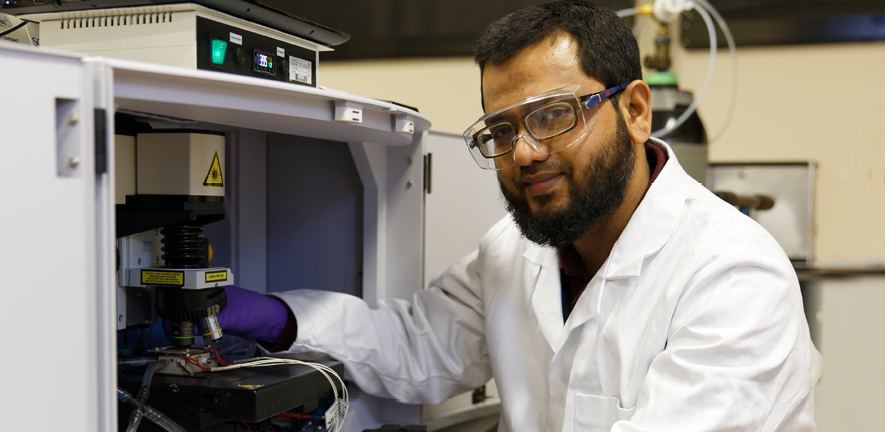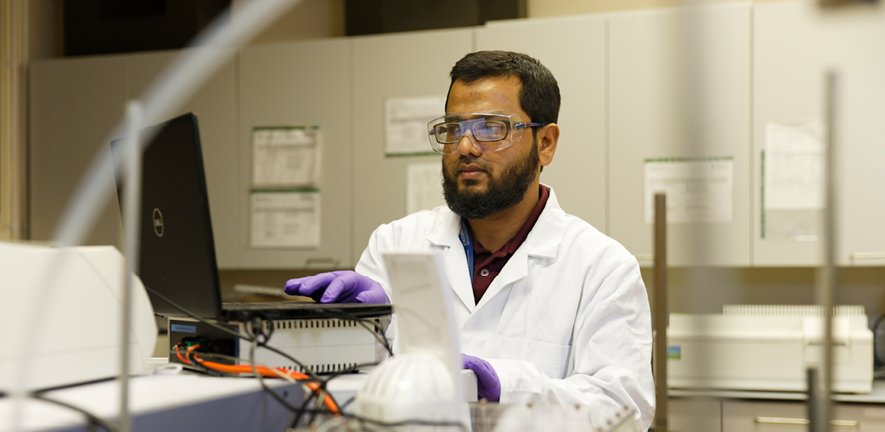
Mobbassar is a postdoctoral researcher in Professor Stuart Clarke’s surface sciences group. His research focuses on corrosion, where a material deteriorates in response to its surroundings. To investigate corrosion, Mobbassar designs and develops custom sample-cells and in-situ setups that can be used in various microscopic and spectroscopic instrument systems to watch chemical reactions happening in real time at the molecular level. Using this and a suite of state-of-the-art techniques, he can observe chemical processes happening on surfaces in extreme environments, such as under intense heat or pressure.
Observing reactions happening in real time is inherently powerful and leads to better understanding of many phenomena. “This is exciting and challenging work that I have really enjoyed,” he says. These techniques could also be employed to characterise and understand surfaces in different supercapacitor materials, which are essential for advances in storing electricity sustainably.
Text to voice technology
Mobbassar has what could be defined as an unseen disability – he has a stammer and struggles to project his voice. “When I raise my voice it’s like a pressure building inside me,” he says. Mobbassar was worried how this would affect his career, especially when lecturing students and giving presentations. “My impediment isn’t visible until I speak – you can’t see my stammer.”
Over 70 million people around the world are affected by stammering. Mobbassar’s solution has been to enlist technology. He uses a speech synthesiser programme for teaching and when he is giving presentations. Mobbassar says the software is a simple way to help scientists who stammer to confidently focus on what they are saying – not how they are saying it. Another advantage he points out is that it makes sure he sticks to a conference time limit! When answering questions, Mobbassar speaks in keywords and phrases whilst simultaneously typing on a blank PowerPoint slide that the audience can see.

Hassan Mobassar ©University of Cambridge
In the past, job interviews have been daunting, even exclusionary, for Mobbassar, and he is passionate that institutions have inclusive practices in place for people who stammer.
Mobbassar feels he has been treated fairly here in the department. For example, when interviewed for his current role, he was provided with more time, and it is in Cambridge where he first started using a speech synthesiser to deliver talks. He says this has been greatly encouraged, and he still uses this technique for lectures and to collaborate in team meetings.
Scientists who stammer
In addition to his research, Mobbassar has published in the journal Nature a correspondence called Communication tools for scientists who stammer. It covers some of the tools he uses to enhance his science communication and it is a useful read for anyone who wants to increase their awareness of how to create a more welcoming environment for people who stammer.
Mobbassar concludes: “There are fewer obstacles to doing great science when working with supportive colleagues.”
Additionally, The bp-ICAM provided funding for Mobassar to attend The Starfish Project stammering course in Feb 2023 via the Diversity and Wellbeing Fund. "The project helped me immensely," comments Mobbassar. "After the course I received an invitation for an interview from my stuttering life podcast." He shares some of the techniques during that interview.

